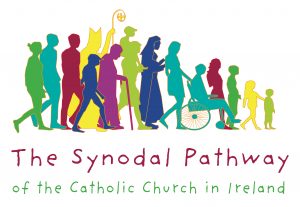
Listening and Consultation in the Diocese of Elphin
On October 9-10th 2021 in Rome Pope Francis launched the theme of the 2021- 2024 Synod of Bishops – For a Synodal Church: Communion, Participation, Mission. The diocesan phase of the Synod was introduced in every parish across the Diocese of Elphin on October 17th 2021. The diocesan phase which involves all local Churches across the globe was the largest consultation with the lay faithful ever to take place and examines what life is like in the Church at this moment in time.
During February and March 2022, parishes, communities, schools and various groups across the Diocese focused on listening and discerning the voice of the Holy Spirit. This process involved a multi-pronged approach as we endeavoured to hear from as many people as possible on a variety of themes associated with their experience of Church, Faith, Spirituality, Parish Life and Practice. Below please find an outline of the stages of our listening and consultation process during March and April 2022.
Following the Meeting of the Diocesan Pastoral Council on 13th January, the following is the agreed plan for the first phase of our Diocesan Conversation. |
| Deanery Conversations and Consultation |
| That conversations would be held in each Deanery along the lines originally planned for 2020, with four lay people from each parish (two under 40 and two over forty; balanced between men and women), accompanied by the clergy of the parish. Details are as follows: |
| Monday March 21st – Strokestown Deanery |
| Wednesday March 23rd – Athlone Deanery |
| Thursday March 24th – Castlerea Deanery |
| Monday March 28th – Sligo Deanery |
| Tuesday March 29th – Boyle Deanery |
| Thursday March 31st – Roscommon Deanery |
| Clergy Conversations and Consultation |
| A diocesan gathering of all Clergy took place on February 8th. Clergy were brought up to speed on the planned process and took part in the same conversation, consultation and listening process that is being offered to all other groups. |
| Focus Groups |
| A series of conversations have been arranged with Focus Groups associated with various aspects of the life of the local Church and its socio-cultural context. These groups will be facilitated by people who are part of that constituency and have received training on facilitation and listening skills. The Focus Groups that have being identified for this stage of the process are as follows. As we progress with the Irish Synodal Pathway, over the next two years, we hope to engage with other groups as not yet identified below. |
| GAA; Ecumenical; Traveling Community; Primary Teachers; Post-Primary Teachers; Irish Speaking Community; Religious; Women; Catechists; Migrants/Asylum Seekers; LGBTI Catholics; Apostolic Groups; Divorced Catholics; Active Age; Youth & Young Adults; Parish Pastoral Councils; |
| Deep Listening Training and Upskilling |
| The Diocese has engaged the services of Maria Garvey who has completed four two-hour training sessions for those who will be facilitating the various group. Maria focused on how to listen deeply so that people are heard and that their contributions are properly heard, recognised and recorded. |
| Structure of Conversations and Gatherings |
| It is recommended that each gathering of whatever type, would begin with:
a. Initial Comments from the facilitator: b. A time of Reflective Prayer c. Content of Conversations 1. What is your personal experience of Church/Parish/Faith? To what extent has it been nourishing; life-giving (for you and for your family)? 2. Christian community needs to be both a place of listening to God’s word and a place where people feel heard. Is this your experience? What helps or hinders you in speaking honestly and courageously in your parish or in society. What voices are not being heard? 3. How would you describe the mission of the Church? Do you see yourself as having a part to play in the mission of the Church? How would you see that taking shape? What helps or hinders your active participation in this mission? The same essential questions, adapted as necessary to the context, would be used for the focus groups and other conversations. We believe that, rather than asking one individual to report from break-out groups (which sometimes allows stronger personalities to dominate), we would follow a fifteen minute conversation with an invitation to each participant, individually, to complete a short written response which, in simple terms says what they want to be heard. An opportunity to submit individual online submissions based on the same questions above, will begin from late March / early April. |


